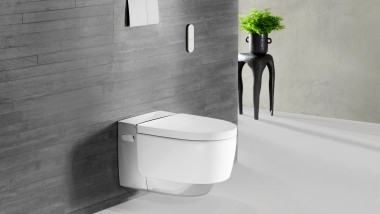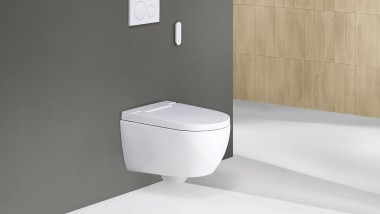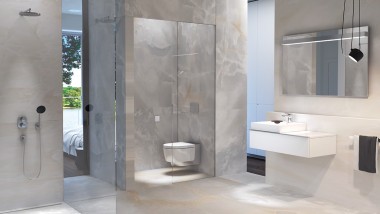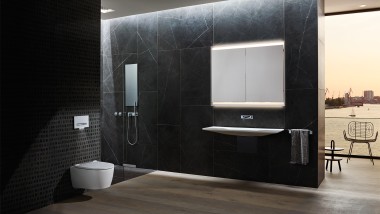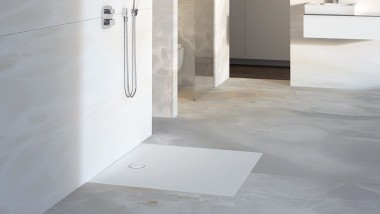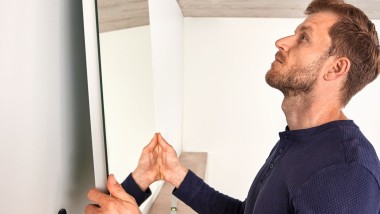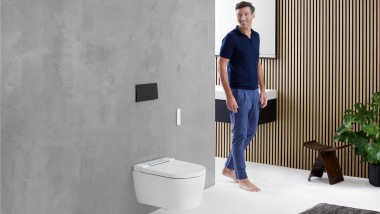Bidet or shower toilet? Differences and functions
With comfort and hygiene becoming increasingly important, the choice between traditional bidets and modern shower toilets has become a central focus when it comes to current bathroom innovations.
While the classic bidet has long been regarded as the standard for personal cleanliness in many cultures, shower toilets are becoming increasingly popular because of their advanced technology and innovative functions. These modern toilets combine the functionality of a bidet with the comfort of a toilet, providing an efficient and hygienic solution for daily well-being.
What is the difference between a shower toilet and a bidet?
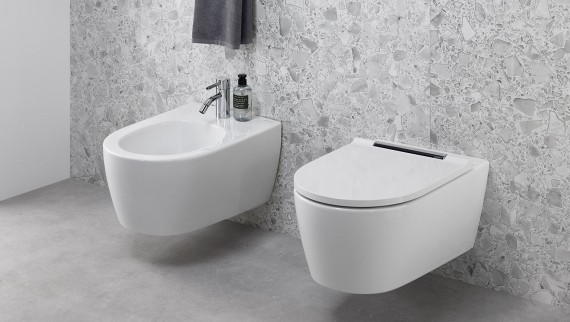
The main differences between shower toilets and bidets lie in their integration and functionality: While the bidet is a separate sanitary facility next to the toilet, the shower toilet combines the functions of a toilet and a bidet in a single device.
A shower toilet is an electronic device that can be operated at the touch of a button. Shower toilets also offer advanced functions such as temperature-controlled water jets, WC seat ring heating and drying functions that are not found in conventional bidets.
Function of a bidet: cleaning as the second step
A bidet is used to clean the intimate area after using the toilet and looks like a low toilet without a seating surface. Its nozzles spray an adjustable water jet for thorough cleaning. After cleaning, the user dries the area with toilet paper or a towel, though modern bidets often offer a built-in drying function.
Function of a shower toilet: remain seated and relax
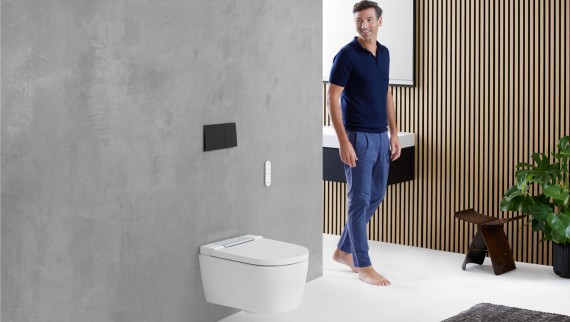
A shower toilet combines the functions of a toilet with those of a bidet. A built-in nozzle in the ceramic appliance is used for personal cleansing with a water jet after using the toilet.
The user can control the temperature and the pressure of the water remotely for a pleasant and thorough clean.
Many models also offer a drying function, which uses a warm air flow.
Bidet or shower toilet: what do you need to keep in mind?
The space that is available, the budget and the desired functions are important factors to consider when choosing between a bidet and a shower toilet. Think about whether ease of use is important to you, or if you would like to make use of features such as a heated seat and built-in dryer.
You should also consider hygiene and maintenance. And finally, design and aesthetics need to be taken into account when making a choice. A modern shower toilet looks like a normal toilet, so it blends into the overall look of a timeless bathroom very well.
Space requirements in the bathroom
Space requirements in the bathroom
A conventional bidet requires additional space next to the toilet, so there needs to be space for two separate sanitary facilities. The exact space requirements vary depending on the model and design, but in general a bidet takes up about the same amount of space as a small toilet.
By contrast, a shower toilet usually does not require more space than a conventional toilet, as it integrates the functions of a bidet into a single unit. However, a shower toilet requires a power connection, which should be taken into account when planning the bathroom.
Hygienic considerations of shower toilets and bidets
The shower toilet and traditional bidet offer improved personal hygiene compared to using toilet paper alone. With shower toilets, the cleaning jet sprays right out of the nozzle, which is more hygienic as there are no surfaces that could come into contact with germs. The regular cleaning and maintenance of both the shower toilet and the bidet require a certain amount of attention to ensure optimum hygiene. Ultimately, hygiene depends on proper use and care of the appliance.
Like conventional toilets, modern shower toilets are also available in rimless models, which have fewer inaccessible places in the sanitary ceramic that can get dirty. This makes cleaning the toilet easier.
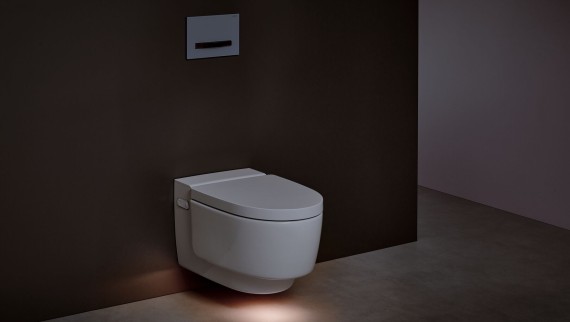
More advantages of the shower toilet compared to the bidet
- Ease of use: A shower toilet is often easier to use because the cleaning functions are integrated directly into the toilet. This is advantageous for all users, but especially for people with reduced mobility or elderly people.
- More functions: Shower toilets often have additional features such as heated seats, adjustable water pressure, temperature regulation, odour extraction, orientation lights or built-in dryers that improve comfort and the user experience.
- Aesthetics: A shower toilet can make the bathroom appear more modern and elegant, as it seamlessly integrates bidet and toilet functions. Modern shower toilets are also available in a wide variety of designs, from matt white coatings to square shapes.
Bidet or shower toilet: our conclusion
A shower toilet is practical and space-saving, because it integrates the spray functionality of a bidet directly into the toilet. It provides a thorough and hygienic clean after using the toilet, without the need for additional space for a separate bidet.
In addition, shower toilets often feature additional functions such as heated seats, adjustable water pressure, temperature regulation and built-in dryers, which increase comfort. It is also the more convenient option, because it can be operated at the touch of a button and you can remain seated for cleaning. A shower toilet also offers a visually appealing solution that can improve the appearance of the bathroom.
Overall, a shower toilet is a modern and convenient choice that increases comfort and hygiene in the bathroom and can prove to be an economic investment in the long term.
Retrofitting a shower toilet
Installing a shower toilet does not require a complete bathroom renovation. There are various options for retrofitting a shower toilet or adding spray functionality to an existing toilet.
Newsletter Register now
Stay up to date
Our newsletter provides fascinating insights and handy tips on how your bathroom can make your life easier.

